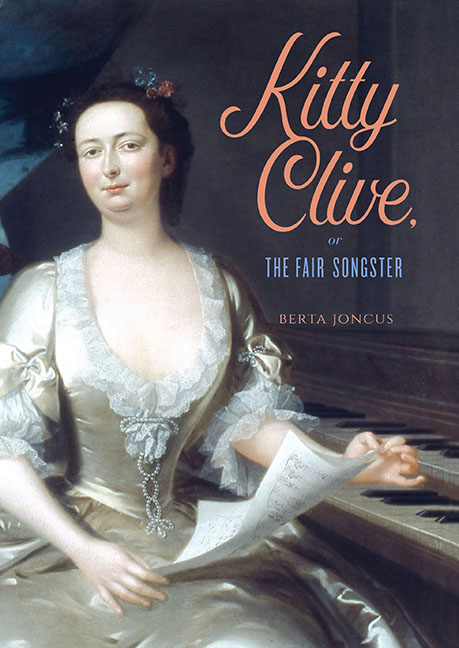Book contents
- Frontmatter
- Dedication
- Contents
- Illustrations
- Preface
- Conventions of Transcription
- 1 The Siren Song: Kitty Clive in the Playhouse
- 2 ‘The Lovely Virgin tun'd her Voice’: Henry Carey and the Production of a Native Songster
- 3 ‘Charm'd with the sprightly Innocence of Nell’: The Metamorphosis of Miss Raftor
- 4 ‘HINT writes, and RAFTOR acts in Drury-lane’: Clive, Fielding, and Theophilus Cibber
- 5 ‘The pious Daughter, and the faithful Wife’: Fielding, Miller, and Clive, 1733–35
- 6 ‘A Likeness where none was to be found’: Contested Images of Clive, 1734–37
- 7 The Patriot Soprano: British Worthies at Drury Lane
- 8 Handel and the Sweet Bird of Drury Lane, 1740–43
- 9 The Case of Mrs. Clive
- 10 Of Scuffles and Rivalries: The Demise of ‘Kitty Cuckoe’
- 11 From Miss Lucy to Mrs. Riot: Voice and Caricature
- 12 Clive on Clive: The Rehearsal: Or, Bays in Petticoats
- 13 Conclusion: The Fair Songster
- Appendix 1 Catherine Clive's Roles 1728–69
- Appendix 2 Lines in Catherine Clive's Repertory 1728–69
- Appendix 3 The Case of Mrs. CLIVE (1744)
- Select Bibliography
- Index
3 - ‘Charm'd with the sprightly Innocence of Nell’: The Metamorphosis of Miss Raftor
Published online by Cambridge University Press: 20 September 2019
- Frontmatter
- Dedication
- Contents
- Illustrations
- Preface
- Conventions of Transcription
- 1 The Siren Song: Kitty Clive in the Playhouse
- 2 ‘The Lovely Virgin tun'd her Voice’: Henry Carey and the Production of a Native Songster
- 3 ‘Charm'd with the sprightly Innocence of Nell’: The Metamorphosis of Miss Raftor
- 4 ‘HINT writes, and RAFTOR acts in Drury-lane’: Clive, Fielding, and Theophilus Cibber
- 5 ‘The pious Daughter, and the faithful Wife’: Fielding, Miller, and Clive, 1733–35
- 6 ‘A Likeness where none was to be found’: Contested Images of Clive, 1734–37
- 7 The Patriot Soprano: British Worthies at Drury Lane
- 8 Handel and the Sweet Bird of Drury Lane, 1740–43
- 9 The Case of Mrs. Clive
- 10 Of Scuffles and Rivalries: The Demise of ‘Kitty Cuckoe’
- 11 From Miss Lucy to Mrs. Riot: Voice and Caricature
- 12 Clive on Clive: The Rehearsal: Or, Bays in Petticoats
- 13 Conclusion: The Fair Songster
- Appendix 1 Catherine Clive's Roles 1728–69
- Appendix 2 Lines in Catherine Clive's Repertory 1728–69
- Appendix 3 The Case of Mrs. CLIVE (1744)
- Select Bibliography
- Index
Summary
James Miller writes for Clive – the first Kitty persona – the ‘rankest Poisons’ of Oxford College Fellows – the death of Anne Oldfield – ballad opera at Drury Lane falters – Clive conjures triumph out of The Devil to Pay – Nell and Clive are one
How to escape managerial control, and how to shed Fenton's mantle: these were interlinked challenges facing Clive as the 1730–31 season opened. Help came unexpectedly from Drury Lane's principal actress, Anne Oldfield. A bold Oxford student named James Miller had written an Oldfield vehicle, The Humours of Oxford (1730), a spoken comedy which included a part for Clive as ‘Kitty’ the inn-keeper's daughter, who also sings an air. Colley Cibber was said to ‘choak’ novice playwrights like Miller, but Oldfield apparently demanded that Drury Lane mount The Humours of Oxford. ‘Kitty’ was Clive's first in propria persona role – that is, a part designed to represent Clive herself – and her first scheming servant role; both kinds of part would prove essential to her later progression.
‘Kitty’ was also the first role to pair her with Theophilus Cibber, and as such was the start of a stage partnership whose mutual abusiveness audiences would come to adore. One critic wrote that Theophilus seemed to have inherited his father's odd appeal: ‘Of all the Comedians … no one has taken a kicking with so much Humour as our present most excellent Laureat [Colley Cibber], and I am inform'd his Son does not fall much short.’ Miller's comedy gave Clive her first chance to kick the younger Cibber – who kicked her back – on behalf of a public which loved to loathe him.
Clive herself created a second breakthrough that season. Performing in The Devil to Pay, a new summer production, she turned the drab cobbler's wife Nell into a plucky sentimental heroine. In response to Town applause the playbook was swiftly cut down to focus on Clive, with enduring impact on theatrical trends in London and across Europe.
- Type
- Chapter
- Information
- Kitty Clive, or the Fair Songster , pp. 64 - 104Publisher: Boydell & BrewerPrint publication year: 2019

